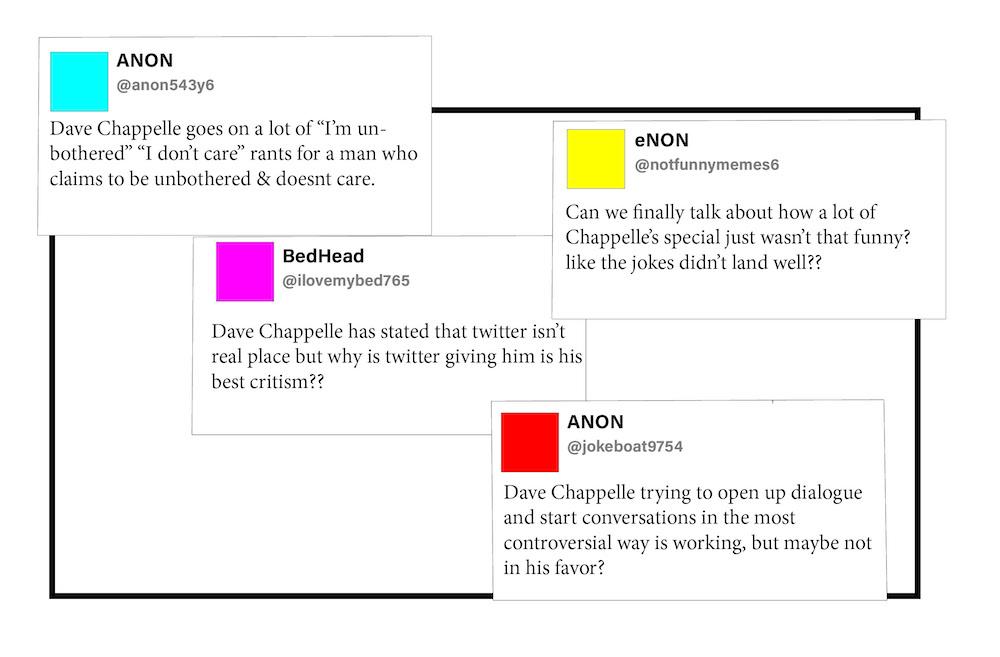
Dave Chappelle is typically acclaimed by critics for his stand-up comedy. With audience ratings never leaving the 90th percentile, Chappelle has been able to cruise along with positive reinforcement… until now.
Oct. 5, Netflix released Chappelle’s “The Closer”’. The 72-minute special was littered with jokes about the LGBTQ+ community, “canceled” celebrity figures such as DaBaby and J.K. Rowling and other commentary about social issues in the U.S.
Chappelle is typically known for being a polarizing figure in the comedy industry. However, this most recent special might have tipped the tides against Chappelle’s favor.
Advocacy groups like GLAAD have condemned Netflix for their release of the episode, citing hypocrisy.
“While Netflix is home to groundbreaking LGBTQ stories, now is the time for Netflix execs to listen to LGBTQ employees, industry leaders and audiences and commit to living up to their own standards,” GLAAD said in a statement.
Ted Sarandos, co-CEO of Netflix, sent an email doubling down on his defense of the special after his initial Oct. 9 memo.
“While some employees disagree, we have a strong belief that content on screen doesn’t directly translate to harm,” Sarandos said in the email.
Sarandos finished off his statement vouching for consumption without action.
“Adults can watch violence, assault and abuse — or enjoy shocking stand up comedy — without it causing them harm to others,” Sarandos said in the email.
Netflix staff were not pleased with this statement, hosting a walk-out on Oct. 20 to protest these statements, which was infiltrated by counter protestors.
The Trans, Non-Binary, Non-Conforming Employees and Allies resource group, which planned the walk-out, released a list of demands for Netflix superiors. This statement called for content investment for non-binary and trans actors, recruiting BIPOC for leadership roles and acknowledging the harm this special has caused.
On the evening of Oct. 19, in an interview with the Wall Street Journal, Sarandos recanted his statements and said “storytelling has an impact on the real world… sometimes quite negative.”
Review
“The Closer” just wasn’t funny. Period.
Having watched all of Chappelle’s specials on Netflix, I expected the same balance he was able to maintain in those. He’s always been vacuous in a comedic way, but “The Closer” seemed too focused on shock value rather than substance.
To make fun of a group of marginalized people requires a steadiness between insensitivity and comedic relief. If the joke is delivered and timed correctly, it can lead to laughter — but if not, it can lead to stoic faces. This happened multiple times throughout the special. Some jokes and commentary Chappelle delivered did land, but many didn’t.
“It’s going to get way worse than that,” he said to the crowd, seeming a bit irritated with the lack of hysterics.
And it did. It got a lot worse. Between misgendering a trans woman (saying “your father was a wonderful woman” was not the poignant sentence it could have been), citing the outrage against DaBaby as “racism” and missing “old school gangster-gays” among other thoughtless comments, his show seemed like a punching-down fest, even if he didn’t mean for it to be.
After revealing his true feelings about the LGBTQ+ community, he ends the special by saying he won’t tell any more jokes unless he’s sure everyone’s laughing together and asks the community to “please stop punching down on my people.”
Let me repeat myself. After spending an hour out of a 72-minute special solely dunking on LGBTQ+ people, he asks for them to stop punching down on him.
Even if Chappelle did not intend to, it’s clear that the special drew a big red line in the sand splitting the LGBTQ+ community and the Black community without even taking into the account the people who exist in both of these circles.
Chappelle is mentally stuck in the height of his career — a time where LGBTQ+ people still had to hide their love for one another, and where his jokes weren’t considered crass but suitable for the times. However, as the 21st century pushes on and society becomes more progressive, Chappelle doesn’t want to let that go. He wants to continue punching up, down, left and right without any backlash, and that’s not how things work anymore. He feels the only way he can get back to this point is to do everything he can to “cancel” himself.
Should Chappelle be “canceled”? No, even though cancel culture doesn’t exist. Should he get new material, understand his audience and develop a shred of sensitivity toward communities he plans on punching down on, or just continue being himself and forget the haters? Depends on who you ask.
I think Chappelle can still be himself without being so dense that it removes the humor from his bits. I also think he should quit complaining about cancel culture and keep pace with the times. As much as he talks about getting canceled, nothing will ever happen to Chappelle, as much as he wants it to. Netflix still gave him $24.1 million and didn’t suffer any real consequences from his special. His credibility, dignity and respect have definitely plummeted, but I’m sure Netflix and any other streaming service, venue or production would spring for a taste of Chappelle.
Katt Williams, a comedian who existed in the same realm as Chappelle, commented on the conversation about cancel culture and emphasized “that [cancellation] are for the benefit of everything.”
“People weren’t all that extremely funny back when they could say whatever they wanted to say … If these are the confines that keep you from doing the craft God put you to, then it probably ain’t for you,” Williams said in an interview on the Joe Budden podcast.
Maybe Chappelle should take this advice.
Rating: D+
Edited by Shannon Worley | [email protected]